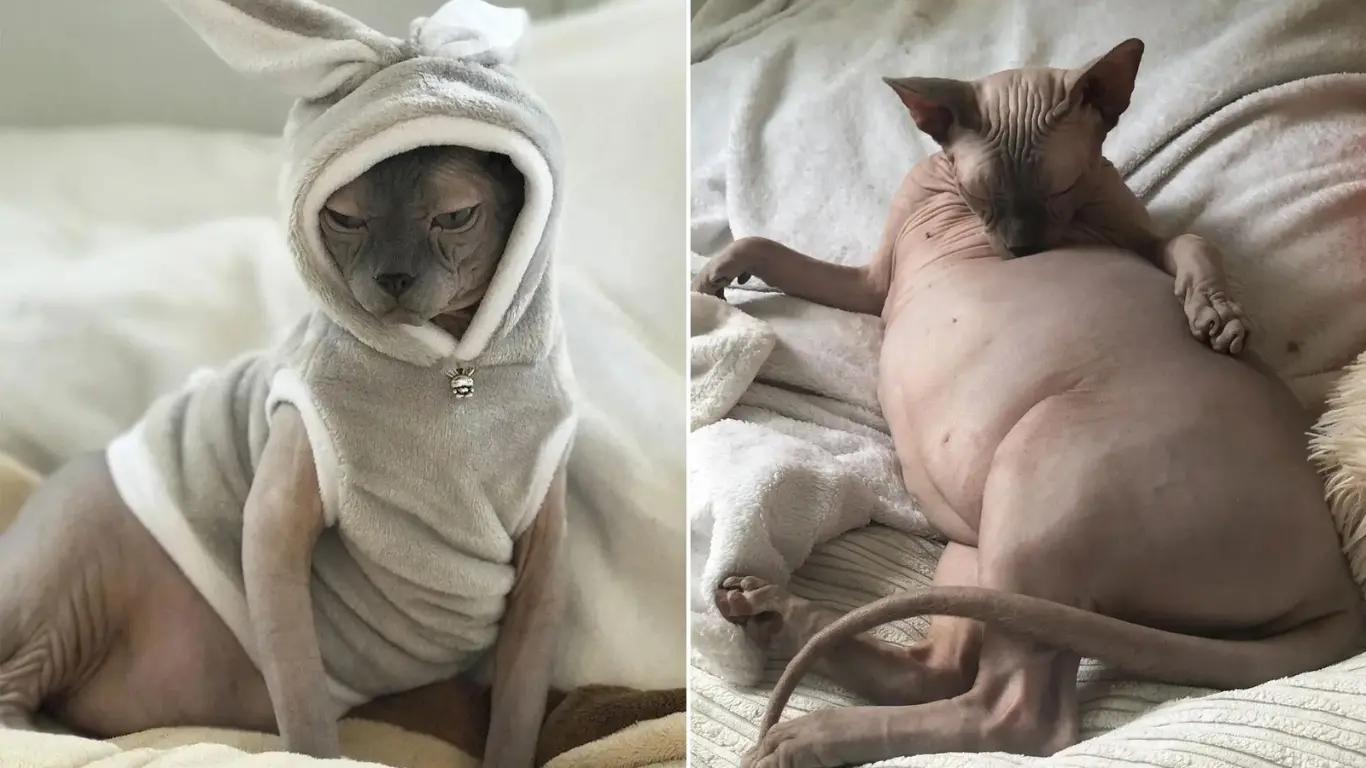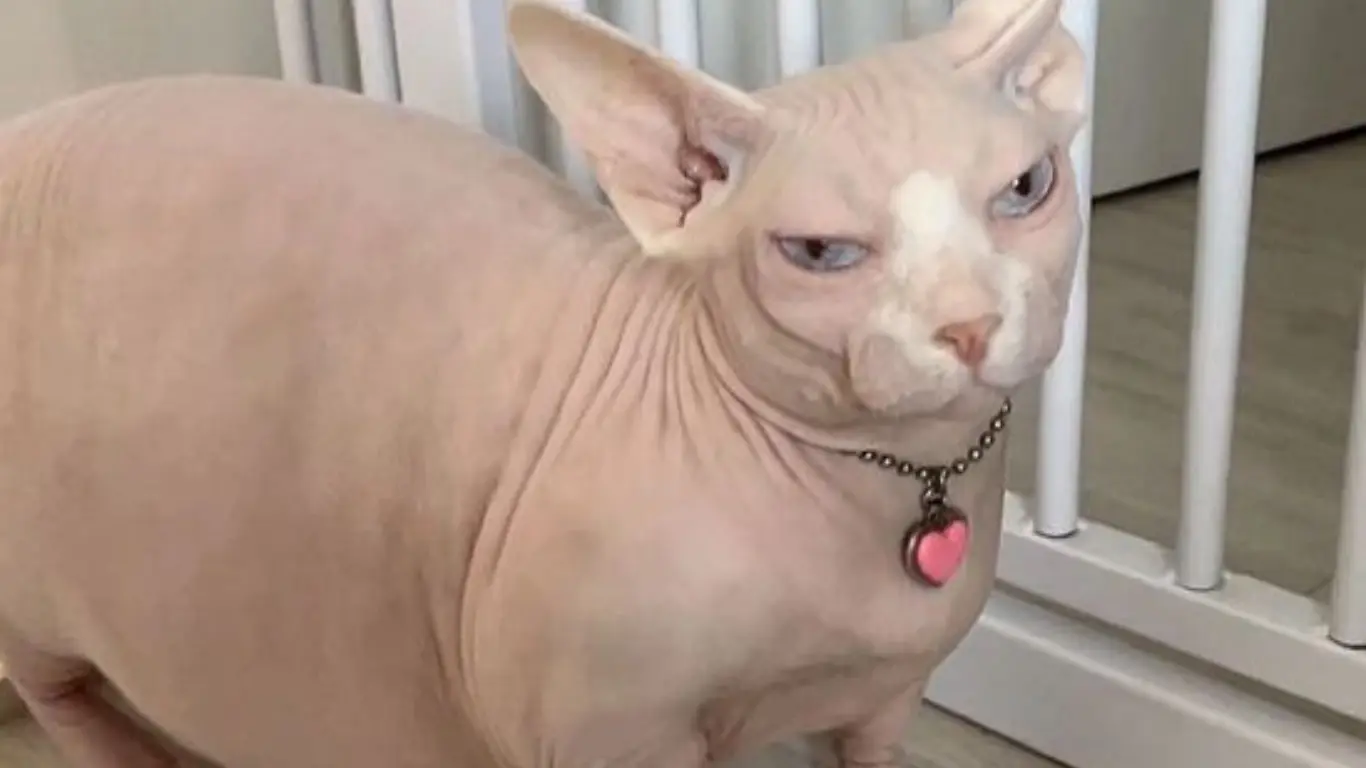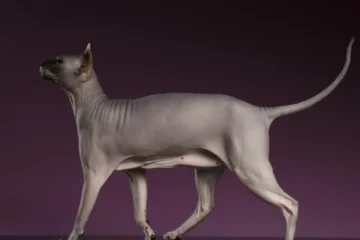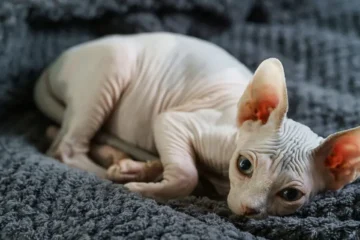The Sphynx cat is famous for its unique look. Its hairless, wrinkled skin makes it stand out. But, what happens when your Sphynx cat starts gaining weight? A fat Sphynx cat is something many owners worry about.
In this article, we’ll dive deep into the world of fat Sphynx cats. We will discuss their health, care, diet, and exercise needs. Plus, we’ll provide tips on keeping your Sphynx cat healthy.
What Is a Sphynx Cat?
The Sphynx cat is a breed known for its lack of fur. Despite their lack of a coat, Sphynx cats are not completely hairless. Some have peach fuzz or tiny hairs on their skin. The breed originated in Canada in the 1960s due to a natural genetic mutation. Since then, they’ve become popular worldwide. Their wrinkled appearance, large ears, and affectionate nature make them stand out.
Sphynx cats are known for their friendly and social personalities. They love attention and are often compared to dogs because they enjoy being around people. But just like other cat breeds, a Sphynx cat can face health problems, especially if they become overweight. A fat Sphynx cat can have unique challenges due to the breed’s specific needs.
Why Do Sphynx Cats Gain Weight?
Sphynx cats are naturally lean and muscular. Their body needs a lot of energy to stay warm because of their lack of fur. Without a coat, they lose heat more quickly than other cats. This means they often need more food to keep their energy levels up.
However, too much food or the wrong kind can lead to an overweight Sphynx cat. A fat Sphynx cat is not just a cosmetic issue. It’s a health concern. Just like in humans, excess weight can lead to many problems for cats. Sphynx cats are no exception.
Some common reasons a Sphynx cat may gain weight include:
- Overfeeding: Many cat owners give their pets too much food. While the Sphynx cat has a fast metabolism, overfeeding can still cause them to gain weight.
- Lack of exercise: Sphynx cats are active and curious by nature. But if they don’t get enough physical activity, they may become a fat Sphynx cat over time.
- High-calorie diet: Sphynx cats need a balanced diet. If their food is too high in calories or lacks nutrients, they can easily become overweight.
- Health issues: Sometimes, underlying health problems, like hormonal imbalances or medical conditions, can cause a fat Sphynx cat.
How to Tell If Your Sphynx Cat Is Overweight
It can be tricky to determine if a Sphynx cat is overweight. Their lack of fur makes it harder to judge compared to furry cats. However, there are some signs you can look for:
- Loss of waistline: A healthy Sphynx cat should have a defined waist. If your cat’s body looks more round than slender, it might be overweight.
- Difficulty moving: A fat Sphynx cat may struggle to jump or climb as easily as it used to.
- Visible fat deposits: You can often feel or see fat deposits on a Sphynx cat’s abdomen or ribs if they are overweight.
- Lethargy: If your Sphynx cat seems less active and prefers to sleep more than play, it might be carrying extra weight.
- Breathing problems: Excess weight can make it hard for your Sphynx cat to breathe comfortably, especially during physical activity.
If you’re unsure whether your cat is overweight, a visit to the vet can help. Your vet can weigh your cat, evaluate its body condition, and give advice on managing its weight.

Health Risks of a Fat Sphynx Cat
Just like in humans, being overweight can lead to several health problems for cats. A fat Sphynx cat is at risk for many conditions, including:
- Diabetes: Cats that are overweight are more likely to develop diabetes. This can lead to other complications if not treated.
- Heart disease: Excess fat puts a strain on your Sphynx cat’s heart, leading to heart problems.
- Joint issues: Carrying extra weight can put stress on a Sphynx cat’s joints. This can cause arthritis or other joint problems over time.
- Breathing problems: A fat Sphynx cat may struggle with breathing, especially during exercise or play.
- Shortened lifespan: Overweight cats tend to live shorter lives than their healthy counterparts. Keeping your Sphynx cat at a healthy weight can help it live a longer, happier life.
How to Help a Fat Sphynx Cat Lose Weight
If your Sphynx cat is overweight, it’s important to take action. Helping a fat Sphynx cat lose weight can improve its health and quality of life. Here are some tips to get started:
1. Adjust Their Diet
Diet plays a big role in your cat’s weight. For a fat Sphynx cat, you’ll need to control portion sizes and choose the right kind of food. Some guidelines to follow include:
- Feed a balanced diet: Look for cat food that is high in protein and low in carbohydrates. This helps maintain muscle mass while encouraging fat loss.
- Avoid free-feeding: Instead of leaving food out all day, switch to scheduled feedings. This helps control calorie intake.
- Measure portions: Use a measuring cup to ensure you’re feeding the right amount. Your vet can recommend the ideal portion size based on your cat’s weight.
- Introduce wet food: Wet food tends to be lower in calories than dry food. It can also help keep your cat hydrated, which is important for overall health.
2. Encourage Exercise
Exercise is crucial for helping a fat Sphynx cat lose weight. Since these cats are naturally playful, it shouldn’t be too hard to get them moving. Try these tips to keep your Sphynx cat active:
- Play with toys: Sphynx cats love interactive toys. Use feather wands, laser pointers, or ball toys to get them running and jumping.
- Use climbing structures: Cat trees or shelves can encourage your Sphynx cat to climb and explore. This burns more calories.
- Schedule regular playtime: Set aside time each day for play. Even just 10-15 minutes of active play can make a big difference in helping your cat lose weight.
3. Monitor Progress
It’s important to track your cat’s weight loss journey. Weigh your Sphynx cat regularly to see if it’s losing weight. You can also track changes in their body condition and energy levels. If you’re not seeing progress, consult your vet. They can adjust your cat’s diet or exercise plan as needed.
Tips for Keeping Your Sphynx Cat Healthy
Whether your Sphynx cat is overweight or not, it’s important to keep them healthy. Here are some tips for maintaining your cat’s overall well-being:
- Regular vet visits: Regular check-ups with the vet can catch health issues early. Your vet can also provide guidance on weight management.
- Good hygiene: Sphynx cats need regular baths to keep their skin clean. Without fur, they produce more oils, which can lead to skin problems if not managed.
- Proper nutrition: Feed your Sphynx cat a high-quality diet. Avoid giving too many treats, and make sure they get the right nutrients.
- Mental stimulation: Sphynx cats are intelligent and need mental stimulation. Provide toys, puzzles, and interactive activities to keep their minds sharp.
- Love and attention: These cats are very social and need companionship. Spend quality time with your Sphynx cat to keep them happy and healthy.
Final Thoughts
A fat Sphynx cat can face many health challenges. From diabetes to joint problems, carrying extra weight isn’t good for any cat. It’s important to keep an eye on your Sphynx cat’s weight and take action if you notice it’s gaining too much. By adjusting their diet, encouraging exercise, and regularly visiting the vet, you can help your Sphynx cat maintain a healthy weight. This will ensure they live a long, happy, and active life.




